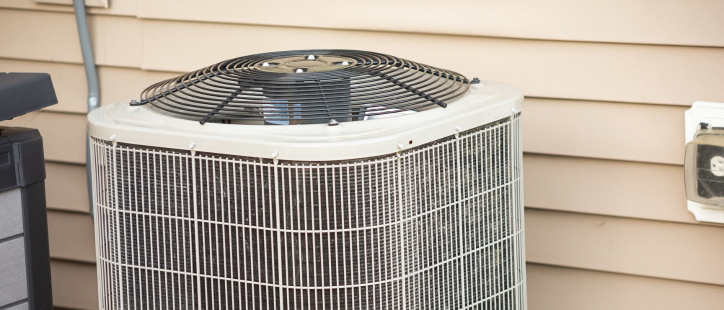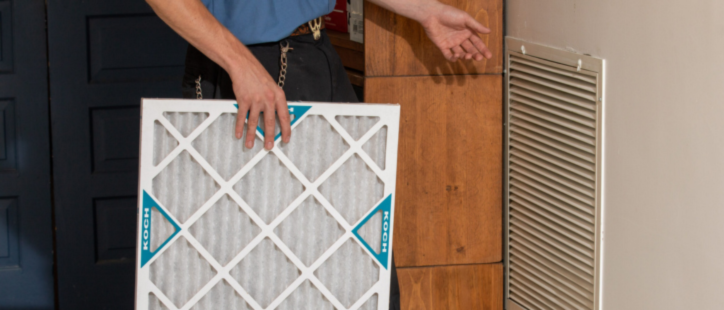The beginning of fall brings many changes for homeowners. Pumpkins and mums appear on porches, sweaters and hoodies come out of storage, and the transition from air conditioning to heating begins. With this seasonal shift, many homeowners start thinking about how to protect their outdoor AC condenser. Should it be covered for the winter?
As HVAC experts, we can tell you: covering your AC unit isn’t always necessary and in some cases, it can actually do more harm than good.
Your AC Condenser Is Built to Weather the Elements
Unlike outdoor furniture, delicate plants, or exterior spigots, your AC condenser is specifically designed to withstand harsh weather. These units are tested to endure rain, snow, ice, and strong winds. That’s why, in most cases, covering your condenser is not required.
In fact, our team at Maffei Services says, “don’t cover it.” Covering your unit may seem like a good way to protect it from falling leaves, debris, or branches, but it can actually trap moisture inside the equipment. That trapped moisture promotes rust and corrosion over time. Mold and mildew can also develop, which can affect both the unit and the air quality in your home once the system is running again in the spring.
The Critter Conundrum
Some homeowners worry that covering their condenser will deter animals, like squirrels or raccoons, from nesting inside. The truth is a wrapped-up unit can become even more appealing to small critters. A plastic or tightly fitted cover can create a warm, protected space—perfect for animals during cold winter months.
Keeping your condenser uncovered is generally safer, as it discourages critters from making it their home. In addition, modern condensers have built-in protections that make them resilient against minor animal intrusions and outdoor conditions.
If You Decide to Cover Your Condenser
We understand that some homeowners still want to cover their units, particularly in areas prone to heavy leaves or debris. If you choose to cover your condenser, there are a few key tips to keep in mind:
- Use a breathable material. Plastic or vinyl covers that don’t allow airflow can trap moisture. A breathable fabric or mesh cover lets air circulate while still providing some protection against leaves and light debris. This prevents the rust and mold issues that non-breathable covers can cause.
- Cover only the top if necessary. A full wrap is rarely recommended. Instead, consider covering just the top of the unit to shield it from falling ice, hail, or debris. A simple piece of wood, or a table-like structure with four legs that hovers above the condenser, is sufficient. This setup protects your unit while allowing air to flow freely around the sides.
Why Airflow Matters
One of the main reasons we caution against fully covering your AC condenser is airflow. Condensers rely on ventilation to keep their internal components in good shape. Trapping air and moisture inside the unit by using a tight cover can accelerate corrosion, damage the electrical components, and even shorten the life of your system.
Even in winter, when the unit is not running constantly, air circulation helps prevent condensation from forming and limits the buildup of debris inside the condenser.
Seasonal Maintenance Tips Instead of Covering
Rather than fully covering your AC unit, there are safer ways to protect it through the winter months:
- Clear debris around the unit. Remove leaves, grass, branches, and other yard waste from the area around your condenser.
- Check drainage. Ensure the unit’s base isn’t pooling water, which can freeze and damage components.
- Trim nearby vegetation. Keep bushes and shrubs at least two feet away from the condenser to maintain airflow and prevent debris from falling inside.
- Schedule an end-of-season check. Maffei Services’ professional HVAC technicians can inspect your unit, make minor repairs, and prepare it for winter.
These steps protect your system without the risks associated with covering it.
When a Cover Can Help
There are a few exceptions where covering the top of your condenser can be useful:
- Protecting against ice and hail. A sturdy, flat cover on top of the unit can shield the fan and coils from falling ice or hail.
- Blocking large debris. If your home is near heavily wooded areas, a top cover can reduce the number of leaves or pine needles that fall directly onto the unit.
Even in these cases, make sure the cover doesn’t touch the sides of the unit. Airflow around the condenser is essential to prevent moisture accumulation and rust formation.
Final Advice From Maffei Services’ HVAC Experts
For homeowners across Essex County, MA and the surrounding area, the rule of thumb is simple: most outdoor AC condensers do not need a full cover during winter. These units are built tough, designed to withstand snow, ice, wind, and temperature fluctuations. Covering them completely can actually do more harm than good.
If you’re concerned about falling debris, critters, or ice, consider a top-only, breathable cover. And always maintain clear space around the unit to promote airflow and prevent moisture buildup.
Above all, schedule professional end-of-season maintenance. A certified HVAC technician from Maffei Services can check the unit, clean coils, inspect electrical connections, and ensure it’s ready for winter and the next summer season.



